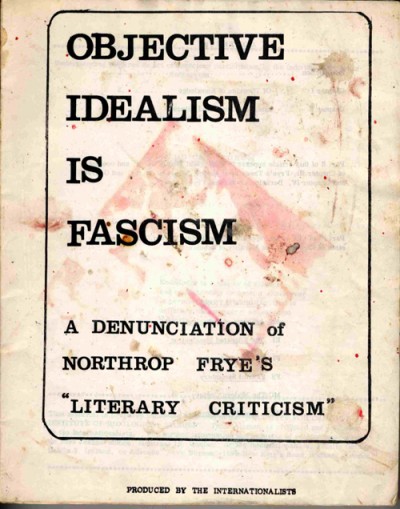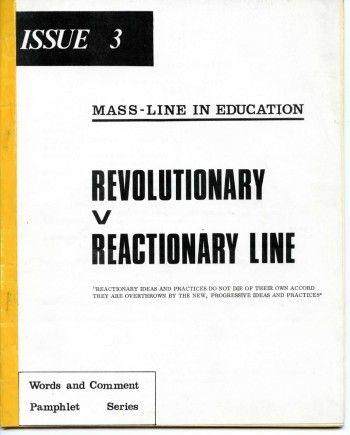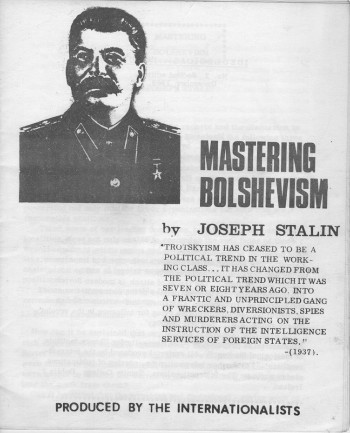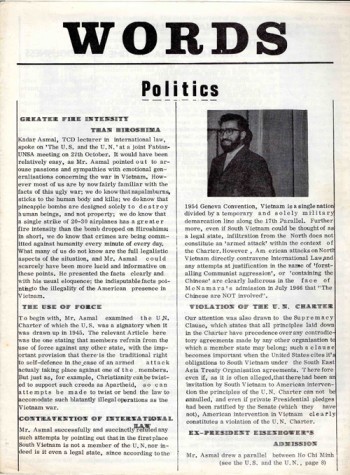Objective Idealism is Fascism
A denunciation of Northrop Frye's “Literary Criticism”

| Date: | 1969 |
|---|---|
| Organisation: | The Internationalists |
| View: | View Document |
| Discuss: | Comments on this document |
| Subjects: |
Please note: The Irish Left Archive is provided as a non-commercial historical resource, open to all, and has reproduced this document as an accessible digital reference. Copyright remains with its original authors. If used on other sites, we would appreciate a link back and reference to The Irish Left Archive, in addition to the original creators. For re-publication, commercial, or other uses, please contact the original owners. If documents provided to The Irish Left Archive have been created for or added to other online archives, please inform us so sources can be credited.
Commentary From The Cedar Lounge Revolution
29th July 2013
This is an unusual document issued by the Internationalists, the precursor group of the Communist Party of Ireland (Marxist-Leninist). In 35 pages it critically examines theories of knowledge and literary theory and literary interpretation. In a preface under the heading ‘Ideological Forum’ it argues that:
There are two most general, wide-spread, and universal lines prevalent in the world about the role of the intellectual in society. One line treats intellectuals as experts in society and bribes them in accordance with their merit. This policy is supported by the imperialists, modern Soviet Revisionists, various liberal bourgeois, and the counter revolutionary Trotskyists. In opposition to this, the second line considers intellectuals as an essential part of society without divorcing them from the masses; they are one with the masses, and are fully integrated with the struggle for production, class struggle and scientific experimentation. Here they are not a privileged class and work wholly for the masses. This line is called mass-line. The mass-line is followed in the People’s Republic of China and the Republic of Albania. The vast masses are conducting the Great Cultural Revolution to make sure that the expert line does not rise again. The mass-line builds initiative of the mass and liberates them from the bureaucracy of the experts; the expert line deprives people of their initiative and puts their destiny in the hands of experts who cannot be held responsible for their crimes against the masses.
The following reference is of interest:
The expert-line, coming from [the Cultural Congress] Havana, the counter-revolutionary line, advocates what in essence is the old, moribund, bankrupt and bourgeois line, and is supported by intellectuals like Noam Chomsky.
The main body of the text is concerned with Professor Northrop Frye, then of the University of Toronto. Frye was a very significant voice in 20th century criticism, and the document is unstinting in its criticism of him:
Professor Northrop Frye … is a well-known reactionary and idealist, the fascist aspect of whose scholarship needs to be laid bare. Who is a fascist intellectual? Fascism springs from a person’s social and intellectual attitudes and it is essential to go into its genesis. When idealists talk of fascism they usually refer to the murderous crusades carried out asa result of social, political or religious dogmas: they picture dismembered bodies and recall all kinds of physical killing and persecution. Idealist historians suggests that all fox sudden somebody, some class of people, or some society went berserk and started kiling people. This isa simplistic definition of fascism, a comfortable rationalisation which ignores the reality of the human situation. Do people become murderers all of a sudden? No. The moment people believe something without undertaking the act-of-finding out they are manifesting a fascist tendency; to accept without questioning the premise involved in a statement, an analysis or a concept is to create the basis of fascism. Cold war slogans operate precisely in this manner. Beliefs devoid of experiential validity and made up of the accumulate prejudices of the society give rise to over fascism. Northrop Frye is a fascist for he bases his literary criticism on the Bible and the Great Chain of Being, on idealist philosophy and clerical obscurantism without undertaking the act-of-finding out.
And the introduction concludes:
To understand the world one must want to change it, not mentally but through mass struggles.
There is considerably more, far too much for a short overview like this, but all told this is an interesting and unusual document.
More from The Internationalists
The Internationalists in the archive



Comments
No Comments yet.
Add a Comment
Comments can be formatted in Markdown format . Use the toolbar to apply the correct syntax to your comment. The basic formats are:
**Bold text**
Bold text
_Italic text_
Italic text
[A link](http://www.example.com)
A link
You can join this discussion on The Cedar Lounge Revolution
By: Starkadder Mon, 29 Jul 2013 10:52:26
I’ve only glanced at the start, but you would never know from
this document that Frye was in the anti-apartheid and
anti-Vietnam War movements.
Reply on the CLR
By: Dr. X Mon, 29 Jul 2013 10:59:19
WTF was wrong with these people?
Reply on the CLR
By: Jim Monaghan Mon, 29 Jul 2013 11:44:10
More on Frye here.
http://www.thecanadianencyclopedia.com/articles/northrop-frye and http://en.wikipedia.org/wiki/Northrop_Frye
and http://home.ca.inter.net/~grantsky/frye.html
He obviously worried the FBI etc. much more than the MLs
Reply on the CLR